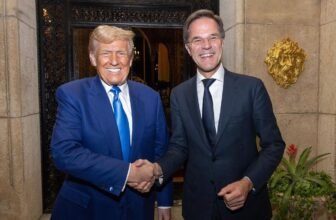
Trump’s Position on Ukraine and Zelenskyy
During The Brian Kilmeade Show, Fox News host Brian Kilmeade confronted former President Donald Trump regarding his stance on the Russia-Ukraine conflict. Kilmeade questioned whether Ukraine would finally win the war and challenged Trump on his repeated claim that the war would never have happened under his leadership. When Trump blamed Ukraine for the ongoing war, Kilmeade immediately interrupted, stating, “That’s Russia’s fault, Mr. President.”
This exchange highlights the growing tensions in U.S. political discourse regarding who is to blame for the Russia-Ukraine war.
Trump has frequently criticized Ukrainian President Volodymyr Zelenskyy, recently labeling him a “dictator without elections.” His frustration stems from what he perceives as Zelenskyy’s failure to negotiate effectively with Russia. Expressing his dissatisfaction, Trump remarked, “I’ve been watching him negotiate with no cards… and I’ve had it.” These comments reinforce Trump’s belief that Ukraine has not effectively leveraged its position in peace talks.
Internal Divisions in the Trump Administration
Despite Trump’s harsh stance on Zelenskyy, some officials within his administration have offered a contrasting perspective. After a recent visit to Kyiv, U.S. Special Envoy for Ukraine and Russia Keith Kellogg described Zelenskyy as “the embattled and courageous leader of a nation at war.”
This endorsement directly contradicts Trump’s criticism, exposing a divide within the Trump administration regarding Ukraine’s leadership and strategy.
Republican Party Split Over Ukraine
The Republican Party remains deeply divided on the Ukraine issue. While some members align with Trump’s views, others—such as Fox News host Mark Levin—have defended Zelenskyy. Levin directly refuted Trump’s statements, arguing that calling Zelenskyy a dictator is misleading and reaffirming that “MAGA is not pro-Putin.”
This ideological split within the party reflects a broader debate over the U.S.’s role in the Ukraine conflict and its position on Russian aggression.
International Reaction to Trump’s Comments on Ukraine
Trump’s remarks have received mixed responses on the global stage. European leaders have expressed concerns over the U.S.’s approach, fearing that Washington may prioritize its own interests over supporting Ukraine’s sovereignty.
European nations, which have heavily invested in Ukraine’s defense, worry that any softened stance from the U.S. could disrupt a unified front against Russian expansionism.
FAQ
What did President Trump say about Ukraine’s role in the conflict?
Trump suggested that Ukraine could have avoided the war by making a deal with Russia, implying that Ukraine shares responsibility for the conflict.
How did Fox News host Brian Kilmeade respond to Trump’s claims?
Kilmeade directly challenged Trump, stating, “That’s Russia’s fault, Mr. President,” emphasizing that Russia is solely responsible for starting the war.
What does the Trump administration think about President Zelenskyy?
While Trump has strongly criticized Zelenskyy, calling him a “dictator without elections,” U.S. Special Envoy Keith Kellogg has praised Zelenskyy as a “courageous leader,” revealing internal disagreements within Trump’s political circle.
How has the Republican Party reacted to Trump’s stance on Ukraine?
The Republican Party remains divided—some support Trump’s critical view of Zelenskyy, while others, like Mark Levin, defend Ukraine’s leadership and caution against aligning with Russian narratives.
How have other countries reacted to the U.S.’s stance on the Ukraine conflict?
European leaders have warned that the U.S. risks alienating allies by adopting a softer stance on Russia. They have urged Washington to maintain strong support for Ukraine’s sovereignty and avoid negotiations that favor Russia.
The ongoing debate within U.S. politics and the international community reflects the complexity of the Russia-Ukraine conflict and the challenges in forming a coherent, unified response.
What are your thoughts on the U.S.’s role in the Ukraine conflict? Do you think internal divisions will impact future foreign policy? Join the discussion in the comments below or share this article to continue the conversation!






